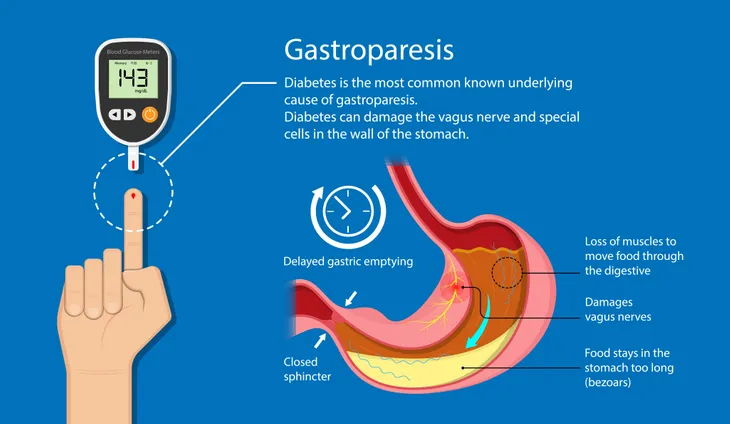Gastroparesis is the literal paralysis of the stomach and is characterized by WebMD as a condition that inhibits the stomach from emptying properly. Gastroparesis affects stomach contractions, which move food from the stomach into the small and large intestines. If stomach contractions don’t work to empty the stomach properly, discomfort can occur (i.e., nausea, bloating, and vomiting), and individuals can suffer nutritional deficiencies as a result.
Here are six common causes and symptoms that accompany gastroparesis…
1. Existing Medical Conditions
According to MedicalNewsToday, common causes linked to gastroparesis include existing health conditions, such as viral infections, eating disorders, cancer with radiation and/or chemotherapy, and stomach (gastric) surgery that causes damage to the vagus nerve. Specific medications can also trigger gastroparesis. The use of nicotine, especially chronic smoking, is also a common cause of gastroparesis.
Certain chronic diseases, such as uncontrolled diabetes, hypothyroidism (underactive thyroid), multiple sclerosis (MS), and Parkinson’s disease, have also been associated with the development of gastroparesis. Rare conditions, such as scleroderma and amyloidosis, that impact the functioning of connective tissues, blood vessels, skin, muscles, and internal organs (i.e., scleroderma and amyloidosis) have also been linked to gastroparesis.
2. Unknown Cases of Gastroparesis
WebMD notes that doctors often have issues pinpointing the exact cause of gastroparesis. Often, the cause of gastroparesis is unknown, which is clinically referred to as idiopathic gastroparesis by health professionals.
Even though the cause of idiopathic gastroparesis remains unknown, researchers at the Mayo Clinic claim that women ranging from young to middle aged are at highest risk of developing idiopathic gastroparesis.
3. Reduced Appetite and Weight Loss
According to research from the American College of Gastroenterology, due to the hindering of normal digestion, gastroparesis patients often end up feeling very full after just a few bites of food, which can lead to rapid weight loss.
As a result of improper digestion and the body not absorbing nutrients, malnutrition often accompanies weight loss. Many gastroparesis patients, particularly those who also suffer with diabetes, have difficulty controlling their blood sugar levels.
4. Nausea and Vomiting
Research from the National Institute of Diabetes and Digestive and Kidney Diseases explains that, because the stomach doesn’t empty properly, the condition causes extreme feelings of fullness after just a few bites of food, which can cause heartburn and vomiting of undigested food.
This nausea and vomiting can last hours following meals. Nausea and vomiting can be worsened if meals consist of rich, fried, greasy, or fibrous (i.e., raw fruits and veggies) foods, as well as carbonated beverages.
5. Abdominal Pain and Bloating
MedicineNet.com points out that along with nausea and vomiting come symptoms of gas and bloating with gastroparesis. Considered primary symptoms, painful gas and bloating often result in uncomfortable abdominal distension.
Although it may sound strange, patients with gastroparesis and other conditions that cause delayed stomach emptying when it comes to solid food, often have the opposite reaction to ingested liquid—they empty them rapidly in a fashion known as dumping syndrome (or abnormally rapid bowel evacuation). Dumping syndrome is often accompanied by painful abdominal bloating and diarrhea.
6. Gastroesophageal Reflux Disease
According to a 2009 report published by the National Institutes of Health (NIH), gastroparesis-related gastroesophageal reflux disease (GERD), also known as heartburn or acid reflux, is commonly due to the prolonged gastric retention of food.
The NIH study explains that “because gastroparesis allows material to remain in the stomach, there is an increase in the gastroesophageal pressure gradient, gastric volume, and the volume of potential refluxate…[in addition,] the prolonged exposure of material in the stomach can increase gastric acid secretion”.









